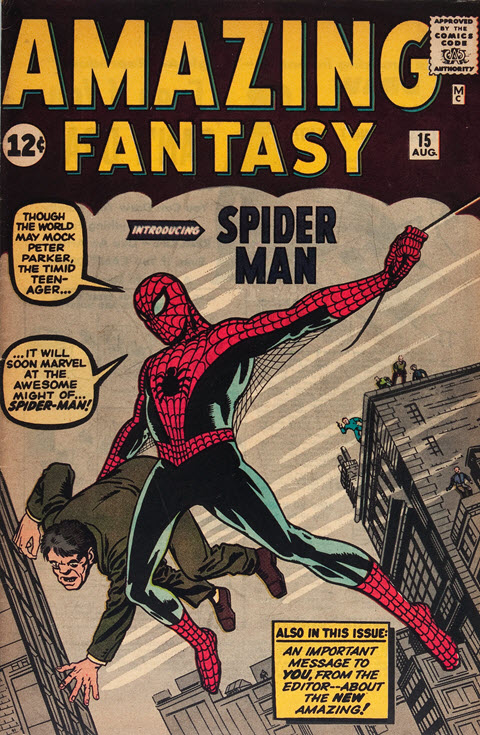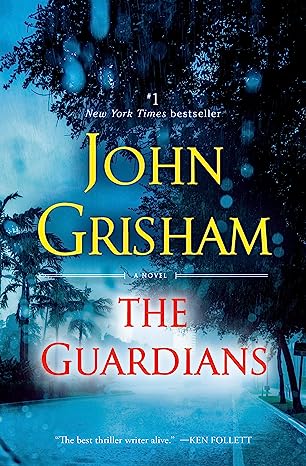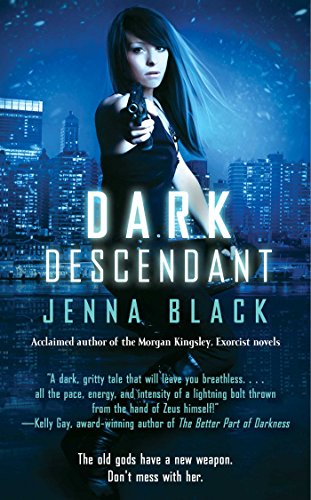The Guardians: John Grisham Tackles Wrongful Convictions
I recently finished John Grisham's The Guardians, a 2020 novel about an Innocence Project-type attorney and Episcopal minister working to free a man wrongly convicted of killing his former attorney in Florida. This is the first Grisham novel I've read since his early novels The Firm and The Client made him a household name. I once took a flight where I saw a dozen passengers with copies of The Firm. That book was everywhere in 1991.
Thirty-three books later, Grisham is still able to write a solidly plotted legal thriller that pulls you into the story and makes you care about the protagonists. Here they are the attorney/minister Cullen Post and the dedicated but criminally underfunded Guardian Ministries, which takes cases to free innocent people who've languished in prison for decades.
Quincy Miller is a Black man who has spent 23 years in prison despite there being no physical evidence presented at trial linking him to the murder and a dubious set of witnesses arrayed against him. Grisham was motivated to write this book by his longtime membership on the board of the Innocence Project.
The book's appeal comes from what it reveals about the legal processes required for an exoneration amid the turf wars, ineptitude, self-interest and outright corruption in the justice system. Post's interactions with cops, prosecutors and other attorneys were my favorite aspect of the book. Horrors abound explaining how bad convictions occur. A vivid example involves a former cop who becomes a dodgy blood stain expert testifying exclusively for prosecutors all over America. In Miller's trial he testified that drops on a flashlight were human blood, based entirely on his analysis of photos because the evidence had disappeared before he could examine it. Only after decades did his work become discredited.
One thing I learned from Grisham was that some countries do not allow the testimony of jailhouse informants:
"You never know with snitches. Professional liars have a way of laughing about their lies. Over his miserable career he's snitched in at least five other cases, all for sweetheart deals with the cops. He has nothing to gain by sticking to the lies he told your jury."
"I'll never forget when they brought that boy in, all cleaned up with a white shirt and tie. At first I didn't recognize him. It had been months since we were in the same cell. And when he started talking about my confession I wanted to scream at him. It was obvious the cops had fed him details of the crime -- cutting off the electricity, using the flashlight -- all that stuff. I knew right then that my ass was cooked. I looked at the jurors and you could tell they were eating it up. All of it. Every last lie he told. And you know what, Post? I sat there listening to Huffey and I thought to myself, 'Man, that guy swore to tell the truth. And the judge is supposed to make sure all witnesses tell the truth. And the prosecutor, he knows his witness is lying. He knows the guy cut a deal with the cops to save his ass. Everybody knew, everybody but those morons on the jury.'"
"I'm ashamed to say it happens all the time, Quincy. Jailhouse snitches testify every day in this country. Other civilized countries prohibit them, but not here."
Their use in the United States is appallingly common. The National Registry of Exonerations estimates that 50 percent of wrongful murder convictions involve perjury by a "jailhouse snitch or another witness who stood to gain from the false testimony."
The novel takes place across North Florida from Gainesville to Jacksonville, then in Orlando and Savannah, Georgia. As someone local to these places I was looking for authenticity and didn't find any.
There are two flashbacks where Grisham goes for shock value with grisly crimes -- once to explain how Post quit practicing law early in his career and another depicting unimaginable violence by a drug cartel.
Though The Guardians is an entertaining read it makes the mistake of never depicting the guilty parties responsible for the lawyer's murder. Post and his team laboriously track them down and lead the FBI to their capture, but we don't get the satisfaction of seeing their reactions to being caught. The novel keeps a laser focus entirely on the protagonists.
There was one character who did the most to frame the convicted man, retiring to a beachfront mansion with millions in the bank earned through using a government position to enrich a cartel.
I spent hundreds of pages wanting to luxuriate in that rat bastard's comeuppance. Post never even meets him! The novel's payoff is much smaller than one would expect from a story about a man going free after 23 years.
Comic Book Fan Proposes in Spider-Man Letter Column

There's a marriage proposal in the lettercol of this week's Amazing Spider-Man 28:
As a lifelong Spidey fan, I never tire of reading about the adventures of our ever-friendly neighborhood Spider-Man. Even after over 900 issues, I say 900 more! Spider-Man means so much to me and my partner of over 13 years. We've been together for so long, and she recently gifted me (believe it or not) a genuine copy of Amazing Fantasy 15! I was flabbergasted! SPEECHLESS!
So I was hoping that the Spider-Team could help me return the favor in a monumental way. She got me the comic that introduced the world's greatest super-hero, so I'm asking if you could my message to her in the greatest comic series of all time!
Katie, I know you're reading this. The world may see Spider-Man as the greatest super hero, but you'll always be my super hero. You've saved me in more ways than I can count. You make me a better person and inspire me to live every day with great responsibility. Will you make me the happiest Marvel fan in the world and marry me?
-- Derek N., Queens, N.Y.
I need to know the grade of the Amazing Fantasy 15 copy that Katie gave Derek. Are we talking CGC 7.0 ($170,000 on MyComicShop.com), CGC 2.5 ($26,000) or ungraded coverless ($10,000)?
The Hardest Thing About Creating Atom Was Naming It

My RSS Advisory Board blog post marking 20 years of Atom includes an expression I learned during that project's boundless debate among a hundred people about what to name the format. An issue so simple that everyone feels comfortable voicing an opinion is a "bike shed discussion," and the length of discussion will be inversely proportional to its importance.
The phrase was popularized by an email from developer Poul-Henning Kamp to a FreeBSD mailing list in 1999. He got it from a 1960s book on project management by C. Northcote Parkinson. Kamp explains:
Parkinson shows how you can go in to the board of directors and get approval for building a multi-million or even billion dollar atomic power plant, but if you want to build a bike shed you will be tangled up in endless discussions.
Parkinson explains that this is because an atomic plant is so vast, so expensive and so complicated that people cannot grasp it, and rather than try, they fall back on the assumption that somebody else checked all the details before it got this far. Richard P. Feynman gives a couple of interesting, and very much to the point, examples relating to Los Alamos in his books.
A bike shed on the other hand. Anyone can build one of those over a weekend, and still have time to watch the game on TV. So no matter how well-prepared, no matter how reasonable you are with your proposal, somebody will seize the chance to show that he is doing his job, that he is paying attention, that he is here.
A bike shed should be painted Pantone 356 C.
What Do I Think of the Pie?
With all the attention the RSS Advisory Board has been getting lately, I've been doing some work on the site, primarily to make it look better on mobile.
I also wrote a tutorial on how to read RSS with PHP using SimplePie. For years my sites have used another library called Magpie to do the same thing, which made me wonder why people keep naming RSS libraries after pie.
SimplePie co-creator Ryan Parman explained this on his blog:
SimplePie is an amalgamation of the phrase "Simple API for Magpie RSS." Magpie RSS was the RSS parser du jour for PHP developers in 2004, and the earliest versions of SimplePie simply wrapped it.
I used SimplePie to add recent board headlines to this blog's sidebar.
Dark Descendant: Urban Fantasy Jack Kirby Could Have Drawn
I picked up Jenna Black's urban fantasy novel Dark Descendant at a Louisiana gas station that still sells paperbacks on a spin rack, reminding me of childhood trips on my 10-speed down the hill in Burleson, Texas, to look for books at the Stop-n-Go.
Dark Descendant is about Nikki Glass, a detective whose case takes her to the compound of a creepy cult outside D.C. on a night where snow and sleet make driving dangerous. This point is demonstrated when she strikes and kills her client, a resident of that compound.
That's bad for business but worse for her life. Turns out he was an immortal with powers and she is a descendant of the only humans who can render them mortal. When one dies the descendant inherits their powers and immortality.
So now she's got the powers of Artemis the Hunter and some immortals think she ran down their buddy on purpose. Rival immortals find out there's a new descendant of Artemis and deeply covet those hunting skills.
That's how the book starts and it's an engaging premise Black doesn't entirely pull off because the characters and dialogue aren't as sharp as the plot. Though it's urban fantasy I read the novel more as a superhero comic. There are two groups of people with distinct superpowers clashing with each other and Nikki's like Kitty Pryde arriving at the Xavier School of Mutants with her suitcase, bell bottoms and a wide-eyed expression. Except Wolverine wants her dead.
Nikki's too passive, which is excusable at first because she's thrown into such weird circumstances but not for an entire novel. At some point events need to start happening because your protagonist made them happen. There are some great fight scenes where she discovers the extent of her powers on the fly. One character with the powers of Eros makes unforgettable and disturbing threats about how he'll use them.
I liked the novel enough to be curious about the sequel but won't be jumping right into it. I need to finish reading entrants for the finals of the SPSFC.
Defending the W3C's Publication of the RSS Specification

The W3C publishes a copy of the RSS 2.0 specification on its website as part of the documentation for its Feed Validation Service. Dave Winer has started making complaints that the W3C is violating his copyright.
As the chairman of the RSS Advisory Board, the group whose document the W3C is republishing, I can state that there is no copyright violation by the W3C. It is redistributing our copy of the RSS 2.0 Specification under the terms of the Creative Commons Attribution/Share Alike license and using our preferred authorship credit: RSS Advisory Board with a link to https://www.rssboard.org.
The RSS Advisory Board has published the RSS 2.0 Specification for 20 years, releasing 10 revisions over that time. The changes have mostly been minor, aside from one clarification that namespaces can be used to extend RSS by adding elements and attributes, not just elements.
The board began publishing the spec under a Creative Commons Attribution/Share Alike license when Dave Winer was still a member. It is redistributable under the terms of that license forever.
Winer wrote this on his blog in 2003:
On July 15, UserLand Software transferred ownership of its RSS 2.0 specification to the Berkman Center for Internet & Society at Harvard Law School.
Berkman then placed a Creative Commons license on the spec, allowing it to be customized, excerpted and republished. ...
The spec can circulate freely thanks to the Creative Commons.
He was correct then and is incorrect now. The spec is in the commons and can circulate freely.
Related Links:
- Discussion of this issue on Hacker News
- More discussion on Mastodon
- Even more on GitHub
Outside In: Jay Duplass Walks the Straight and Narrow

I was trapped in an endless scroll through Netflix movies the other night until I saw one of the Duplass brothers.
Jay Duplass stars in the 2017 movie Outside In with Edie Falco and Kaitlyn Dever. He plays a man released after 20 years in prison because of the efforts of his former English teacher Falco, who championed his cause. Dever portrays Falco's 17-year-old daughter, who is alienated after being raised by a mother who champions causes.
I'll watch any movie or TV series involving the Duplass brothers because I like how they embrace the mundane in their work. Even when big events happen in the lives of their characters, they only get small payoffs. It reminds me of a speech I attended in the 1980s where Kurt Vonnegut drew a graph with lines that curved up and down to represent the rise and fall of fictional lives. Then he drew a straight line and called it real life, cautioning us not to drive ourselves mad expecting our lives to be a good story.
Duplass characters stay close to that straight line.
In Outside In, the protagonist Chris was imprisoned because of a murder. Someone was shot and killed by people Chris knew and he was the only one who stayed behind to render aid. He returns home upon release to the downtrodden Granite Falls, Washington, community where it occurred.
Unable to find anyone who will hire him and hurt by his family's abandonment during his imprisonment, Chris is adrift in the world upon release and feels close to nobody other than his married teacher Carol, who he loves. When his feelings make the relationship difficult for Carol to manage, he is befriended by her daughter Hildy, who tells her mother "he has no one." This is not a triangle and never salacious.
Duplass is effective as the gentle and decent Chris, who is emotionally on a level closer to the 18-year-old who went in than the 38-year-old who came out. Falco gives the strongest performance in the toughest role, showing the audience every step and misstep of Carol deciding what she wants her life to become.
I rooted for all three protagonists and thought the ending was wonderful. And small.



